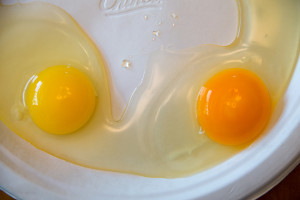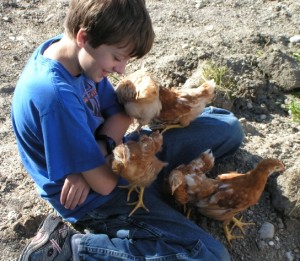This is a guest post by Betty Pearson, Utah County, Utah Chapter Leader for the Weston A. Price Foundation. Weston A. Price Foundation is a nonprofit, tax-exempt nutrition education foundation. Read our mission statement. . . Become a member and receive our lively and informative quarterly journal. Click here for a message from Sally Fallon Morell. Read our Dietary Guidelines here.
Betty is married to her best friend, Karl, and mom to seven kids, two of which are in the Military. She enjoys organic gardening, history, and home schooling (all of her kids are now graduated). As someone dealing with Celiac disease, diabetes, asthma, and fibromyalgia, she is very interested in nutrition and health issues. She is the group owner of several email groups at OurLDSFamily.com.
 I had a good friend drop by our home one day, and as she looked out into our backyard, she said, “You know, if you get chickens, you won’t have to pull the weeds that grow under your trees. Chickens will get rid of them for you.”
I had a good friend drop by our home one day, and as she looked out into our backyard, she said, “You know, if you get chickens, you won’t have to pull the weeds that grow under your trees. Chickens will get rid of them for you.”
That surprised me. “Really? I didn’t know chickens ate weeds.” I’m a born and raised city gal, and it showed. She said, “Oh, they will eat dandelions and alfalfa, and some grasses, but what they love to do is scratch, and that gets rid of the weeds.”
I hate weeds. I have allergies, and weeds make me suffer. The more I thought about it, the more I liked the idea of getting some hens. However, because we live in a suburb and don’t have animal rights, I didn’t think it would be possible to have chickens in our yard.
That same week, another friend visited. We started talking, and yes, she has chickens in her backyard, too. She loves her chickens. I mentioned that I wished we could own some, and she said, “You can! You are allowed six hens. The city considers them ‘household pets.’ If you call the city and ask the right question, you’ll find out you can have them.”
The next day I called our city offices and asked them what household pets we are allowed to have. Sure enough, six hens were listed as permissible household pets. Yay! I was so excited.
Oh, and household doesn’t mean we keep them inside. I had to explain that to a couple of my kids because they imagined sitting on a living room couch petting cute little chickies.
I knew absolutely nothing about chickens and spent days researching the internet about them. I even found a chicken email group and joined it. The members of the group were very helpful, but many of them didn’t live in our type of cold and dry environment. I had to ask questions from our hen-owning neighbors.
Benefits of Backyard Chickens
Yes, chickens get rid of weeds under trees. They also eat grasshoppers and crickets and other bugs and creepy crawlies (aside from bees and ants).
Their eggs are wonderful! Give them food and water, room to move, and a protected environment, and they will give you a wonderful gift at least every other day: a very healthy egg.
Did you know that a free range egg has:
- 1/3 less cholesterol
- 1/4 less saturated fat
- 2/3 more vitamin A
- 2 times more omega-3 fatty acids
- 3 times more vitamin E
- 7 times more beta carotene
(As reported in Mother Earth News, 2007)
Not only that, but having your own chickens helps you become more self-sufficient. If the trucks stopped hauling food to your grocery store, you could walk to your backyard and collect fresh eggs to feed your family. And I love the idea of having fresh eggs instead of dehydrated egg powders.
Choices to Make
If you have decided to have backyard chickens, you’ll need to make some choices. Are you wanting chickens for their meat, or for their eggs, or maybe both? We decided that we preferred having eggs rather than a meat bird. Once you have made that decision, then you’ll know what kinds of hens to buy. Not all hens are created equal!
Oh, and you may not want to eat your chickens after they are done laying because they might be so old it will be like eating boiled shoe leather.
Chicks are only available in the springtime. If you are lucky, sometimes you can find people giving away chickens on Free Cycle or other community lists. (Craigs List, KSL Classifieds.)
We started out with Star hens. Our neighbors had this variety, and they tend to lay more eggs during cold weather. That is a plus. Many varieties of hens slow way down in egg production during the winter.
We have tried Buff Orpingtons, Americanas (lay blue-green colored eggs), Delawares, and right now we have sex-links. We liked Star hens the best, because they are child friendly and produce well. They are related to the sex-links. Buffs like to brood, meaning, they’ll sit on eggs all day, thinking they’re going to hatch. If you have property and animal rights, you can raise your own chicks, and Buffs make excellent mothers. However, they do not lay eggs when they are brooding, and this becomes very annoying if you want eggs. My youngest son loves Buff Orpingtons. They let him hold them and pet them like a cat. 🙂 They are very gentle with children.
Americanas are temperamental. We had two of them for the fun colored eggs.
And no, the eggs on the inside of the shell are not colored. (We get asked that all the time.) However, with Americanas, they are more easily upset than a teenage girl. They stop laying if anything bothers them. Weather, food, little kids chasing them, or if something startles them, they won’t lay eggs.
If you have children, you need friendly hens. White Leg-Horns are not friendly. They produce beautiful, pristine white-shelled eggs, but they will pick on and even kill other hens, and are mean to children. Also, roosters are noisy and mean. Most cities and suburbs will not allow you to have a rooster unless you have animal rights.
Do some research online and decide what types of chickens best fit your needs. For us, we have a large family and need hens that are high egg producers.
Chicken Coops
Utah winters get very cold, and hens will need protection from the elements. Sun in the winter and shade in the hot summer. We live in an area where chickens not only need protection from the weather, but from predators. Hawks, minks, skunks, and raccoons like to kill hens just for sport.
Choosing a coop can be easy and fun, or for those who are more adventurous, you can build your own, which is what my husband did. He made an amazing coop that has a section for roosting (hens sleep on a round stick or branch, above the ground) and nesting boxes where they lay their eggs in a semi-dark area. Then we have the “summer home” in the front half of the coop where the hens enjoy good ventilation and a nice place for their food and water.
Your coop needs to be in a safe place from predators. Raccoons are smart stinkers and can open most latches. We designed our coop doors so that they cannot get into the coop, using two different kinds of latches on each door. We used hardware cloth on the windows and doors and underneath the floor so that predators cannot poke or squeeze their way in between wires or fencing.
You can do an internet search and find cute doll-house type coops, and even converted storage sheds or dog houses. Decide how many hens you want, and then choose what size coop you’ll need for that number to keep them happy and healthy during snowy, cold winter days. Also decide whether or not to build your own, or buy something and convert it to a coop with nesting boxes.
We have a few neighbors who have chosen not to have very protected chicken coops, and they’ve all found dead hens in the morning. One neighbor had a hen get missed by a predator because she was roosting on the top of the fence, and the predator didn’t see her. If you want to keep your hens safe, you need a secure coop to lock them in each evening.
With a little training in the beginning (putting them into the coop when the sun is setting for a few days), hens learn really quickly where home is and get inside on their own.
Food and Care of Chickens
Our first few batches of hens were very free range until I had grandchildren who were scared to death of hens. Now our hens are in a fenced area. However, it is a very large area that takes up the entire width of the back of our property, with plenty of room to roam. In the fall, we let them forage in our already harvested garden.
If you plant a backyard garden, you’ll need to keep it fenced, or keep the chickens in a fenced area, or they’ll eat every tomato, squash, and cucumber you grow.
Our chickens have a water heater to keep their fresh water from freezing in the winter. We buy organic scratch and lay-pellet food. I supplement with all kinds of kitchen scraps, and even occasionally buy crickets from a pet store as a treat in the winter. Some people have the space to grow their own grains and chicken food. Others create their own mixes. I simply have not had time to do it.
We live in an area where it freezes, and we get snow during the winter months. The chickens we’ve had do NOT like snow, and refuse to go out of the coop when snow is on the ground. Chickens need dirt to scratch in, so we built a separate section for our coop. It has three walls and a roof, a dirt floor, and it is open to the south to catch the warm rays of the sun during the cold winter months.
When I harvest my garden, the chickens get the leftovers. Tomatoes and carrots are their favorites. I also buy organic greens during the winter for the hens. Do not feed them cabbage or onions unless you want a slightly different tasting egg. Chickens LOVE fruit, and they get our melon rinds, fruit peelings, peach and apple skins, and any over ripe fruit that no one wants to eat. Some say that hens won’t lay eggs as well if they get a lot of fruit. I haven’t noticed a difference. We also give them corn-on-the-cob ears and other leftovers.
I’ve heard of some growing wheat grass for their hens. Others grow earthworms and other bugs such as mealworms. Right now, I prefer to buy my bugs at a pet store.
Caution: do not let your hens free-range on grass that has Weed and Feed used on it, or other pesticides/poisons.
We save leaves from our trees, and let the hens scratch through them in the Fall. Piles of leaves on the ground collects bugs, and the hens love that.
You can create a good, warm environment for your hens and supplement their food with fresh food during the cold months. In the winter when we get a hard freeze, we use a heat lamp in the roosting area of the coop.
Some owners like to keep the atmosphere surrounding their chickens as natural as possible, meaning they give their birds a rest from laying during the winter. They can afford to do this because they’re allowed more hens, and they stock pile the extra eggs. In our situation, where we can only have six, we need them to lay year round. We encourage this by using a timed light that gives them at least fifteen to seventeen hours of light every day during the winter.
We keep our hens about five to six years. By six years they have slowed down in egg production and it becomes costly to feed them and only get a few eggs. We usually give ours away through Free Cycle, and start over again with a new batch of chicks.
Because we keep them so long, we let our kids name our chickens. Usually my youngest does that, but one year, my daughter picked out a Black Star and named her Attila the Hen.
I’m sure you’ll have more questions and can find a lot of good information on the internet. If you are really interested, I recommend the book Free-Range Chicken Gardens: How to Create a Beautiful, Chicken-Friendly Yardby Jessi Bloom. It’s a fun read.
I wish we had known about backyard hens sooner: we would have chosen to have them for years and years. Not only has it been rewarding for our kids to help the birds grow from chick to hen, but having fresh eggs whenever we want them has been wonderful. We highly recommend chickens!













Our yard at this house isn’t fenced, but we hope to move in the next couple of years to an acreage and have plenty of room for chickens! I’m bookmarking this post to help me, when the time comes. 🙂